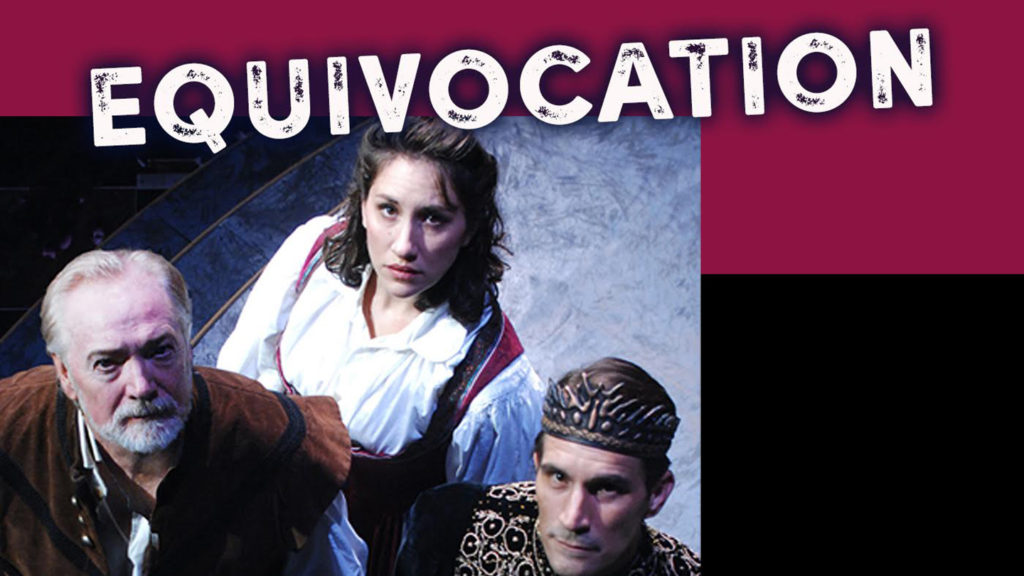 “Richard,” says Shagspeare the playwright, “this is dangerous.”
“Richard,” says Shagspeare the playwright, “this is dangerous.”
“It’s a play!” his actor answers. “We’ve been through worse, haven’t we?”
“No,” the playwright replies sadly.
——–
Lamb’s Players amazingly popular show American Rhythm closed last month after a four-month run, and now the theater is venturing into new territory. Equivocation, a critically-acclaimed play originally written by Bill Cain, attempts to answer the question, “How do you tell the truth in dangerous times?” In other words, how do you equivocate, telling the truth in a way that you will not harm the innocent? And, in this production, how do you write a play for the king in a way that may subtly uncover his deception?

Equivocation is set in Shakespearean times, and it features “Shagspeare” as one of its main characters. The king’s henchman, Robert Cecil, commissions Shagspeare to write a play about the Gunpowder Plot, a foiled plan on the part of British noblemen to blow up the Parliament building. Cecil desires the story to be told in a way that is advantageous to the king (“propaganda,” “a sermon, not a play”). Shagspeare, in seeking the true story to write his play, interviews men that Cecil has imprisoned. It seems the deeper he digs, the more muddying facts and falsehoods he uncovers.
Equivocation is a complicated piece of work, and it requires some mental gymnastics to keep up with the switches between reality and rehearsal, between Shakespearean language and modern-day dialogue. It is also helpful if the viewer has a good grasp of history (although a timeline is provided in the program) and a knowledge of Shakespeare’s plays, particularly Macbeth.

At times I wondered if the play was trying to do too much: depict history, ask deep philosophical questions, wax metaphorical about theater and acting, and spin a Shakespearean drama in the midst of it all. However, my husband disagreed, and he concluded that the play made him feel smarter while also teaching him a great deal about a historical period and Shakespeare’s life and personal challenges.
As always, the set design at Lamb’s was exquisite. This time Sean Fanning’s design beautifully depicted the Old Globe Theatre in which many of Shakespeare’s plays were introduced. Lamb’s Players productions often feature live musicians in the set, and this time a lone cellist sat quietly in the shadows. She was dressed in period costume, and her music blended perfectly with the mood of the play: keening harmony, sometimes eerie, often creepy.

All the actors threw themselves into the drama with passion, and every actor was required to perform multiple roles. Only six men played the part of over 16 different characters. Robert Smyth, Lamb’s Producing Artistic Director, played the part of Shagspeare, and he beautifully portrayed the burden of the truth that weighed heavily on the conflicted playwright’s shoulders. Francis Gercke played the part of Robert Cecil with convincing malice as well.
For all lovers of Shakespeare, and all who have wrestled with how — or whether — to tell the truth, Equivocation offers much to enjoy and consider. As Shagspeare says, “We’re all fools, and noble, and royal, the terrifying thing is that we get to choose which we’ll be.”

Equivocation is running October 15 through November 20 in Coronado. Directed by Lamb’s Associate Artistic Director Deborah Gilmour Smyth, with scenic design by Sean Fanning, costume design by Jeanne Reith and lighting design by Nathan Peirson. Performances for Equivocation are Wednesday & Thursday at 7:30pm, Friday at 8pm, Saturday at 4pm & 8pm, and Sunday at 2pm.
Tickets range from $22 to $68 depending on the day of the week and section of the theatre. Discounts are available for Youth ages five to 17, Seniors ages 66 and above, Veterans, Active Duty Military, Lamb’s Season Ticket Holders, and Lamb’s <35Club members.
Tickets are available online at www.lambsplayers.org or through the Lamb’s Box Office – 619.437.6000 (Tue – Sat, noon to 7).




